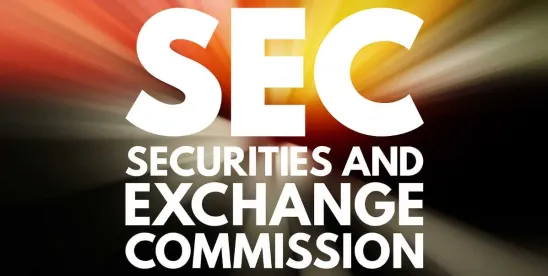Bitnomial Exchange, LLC (Bitnomial), a designated contract market (DCM) registered with the Commodity Futures Trading Commission (CFTC), has launched a legal offensive against the US Securities and Exchange Commission (SEC), challenging the agency's attempt to exert authority over the futures exchange's self-certified XRP futures contracts.1 The lawsuit, filed by Katten on behalf of Bitnomial in the US District Court for the Northern District of Illinois, seeks declaratory and injunctive relief against the SEC's attempt to classify XRP futures as security futures. The futures exchange contends that the SEC's position creates an untenable situation, forcing Bitnomial to choose between abandoning its plans to list XRP futures or risking enforcement action by proceeding.
Bitnomial's Self-Certification of XRP Futures
The lawsuit details Bitnomial's efforts to list XRP futures contracts through the CFTC's self-certification process.2 On August 9, Bitnomial filed a self-certification with the CFTC to trade XRP futures on its exchange.3
Among other things, Bitnomial's XRP futures would be a physically settled, margined futures contract based on the price of 100,000 XRP. Each contract would enable market participants to buy and sell the obligation to deliver or receive 100,000 XRP on a specific future date at a specific price. The physical delivery of XRP would be anonymous and completed through a clearinghouse regulated by the CFTC. After the filing, the CFTC requested additional information but did not stay the listing, effectively authorizing Bitnomial to proceed under CFTC regulations.4
However, as alleged in the complaint, the SEC intervened, asserting that XRP futures are security futures subject to federal securities laws.5 The SEC's position allegedly stems from its view that XRP itself is an "investment contract" and, therefore, a security under the Securities Act of 1933 (Securities Act) and the Securities Exchange Act of 1934 (Exchange Act).6 This interpretation would require Bitnomial to register as a national securities exchange with the SEC before listing XRP futures — a step Bitnomial argues is unnecessary and beyond the SEC's authority.
Bitnomial contests the SEC's position, arguing that the agency is overstepping its statutory authority and that XRP futures are not security futures and should fall under the exclusive jurisdiction of the CFTC.7
Regulatory Status of XRP
Central to Bitnomial's argument is the recent decision in SEC v. Ripple Labs, Inc.8 In that case, the District Court for the Southern District of New York rejected the SEC's argument that all sales of XRP constituted sales of investment contracts. The court found that "XRP, as a digital token, is not in and of itself a 'contract, transaction[,] or scheme' that embodies the Howey requirements of an investment contract."9 The court also ruled that Ripple's programmatic sales of XRP on digital asset exchanges, which were blind bid/ask transactions, did not constitute sales of investment contracts.10
Bitnomial contends that since XRP is not inherently a security (and thus a non-security commodity), and anonymous sales of XRP on the secondary market are not sales of investment contracts, XRP futures cannot be classified as security futures.
No Way Forward
Bitnomial's complaint also highlights a critical regulatory catch-22. The futures exchange argues that compliance with the SEC's interpretation is not feasible, as XRP is not registered as a security with the SEC—a prerequisite for listing single stock security futures. Current regulations require the security underlying a single "stock" security futures product to be registered pursuant to Section 12 of Exchange Act.11 However, XRP is not registered as a security, and Bitnomial lacks the authority to register it.
This situation underscores a significant gap in the regulatory framework for digital assets. While the CFTC and SEC have previously issued joint orders permitting certain unregistered securities (such as debt securities) to underlie security futures products,12 no such exemption exists for digital assets like XRP.
Relief Requested
The lawsuit seeks two primary forms of relief. First, Bitnomial requests a declaratory judgment that XRP futures contracts are not security futures under the Exchange Act. Second, the exchange seeks permanent injunctive relief to prevent the SEC from asserting jurisdiction over XRP futures or pursuing any investigation or enforcement action against Bitnomial related to listing, trading, purchasing, or selling XRP futures on its exchange.
The complaint emphasizes that the question of whether XRP futures are properly classified as security futures under the Exchange Act is a purely legal question that can and should be resolved by the court. Bitnomial argues that it has no other recourse absent relief from the court, as there is no process to appeal the SEC's position.
Final Thoughts
The Bitnomial lawsuit highlights the ongoing regulatory challenges in the cryptocurrency space, particularly regarding the classification of digital assets and related financial products. A similar scenario emerged earlier this year involving Ether (ETH), where a special purpose broker-dealer announced that it would offer custodial services for ETH as a digital asset security.13 This move has made the regulatory status of ETH as a non-security commodity murky, even as the SEC in July approved several spot Ether Exchange Traded Products (ETPs) as commodity-based trusts.14
For Bitnomial, the ability to list XRP futures is at stake. The futures exchange argues that XRP futures should fall under CFTC jurisdiction as a commodity derivative, not a security future. This classification is crucial, as it determines the regulatory framework under which these products can be traded. If the SEC's position prevails and XRP futures are classified as security futures, it would significantly impact Bitnomial's business model, as the exchange would need to either abandon its plans to list XRP futures or face potential enforcement action. This situation creates a challenging environment for innovation and market development in the digital assets space.15



 />i
/>i

